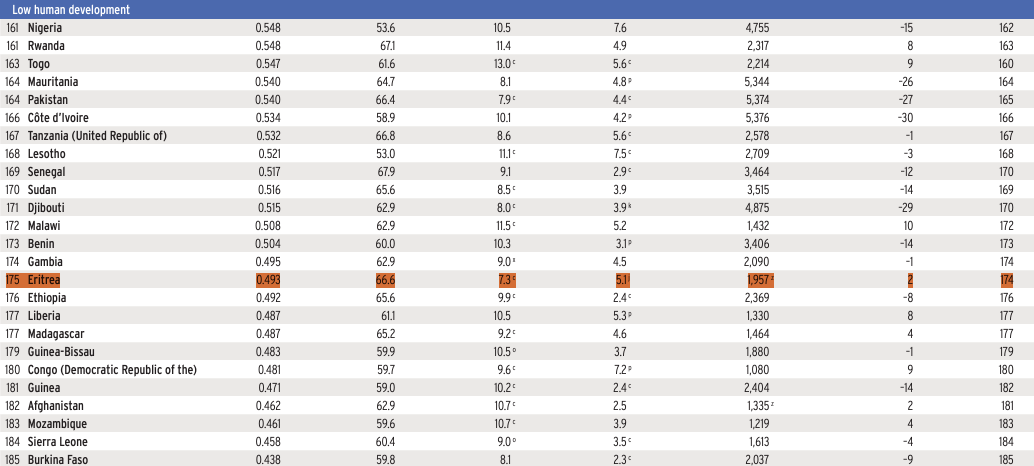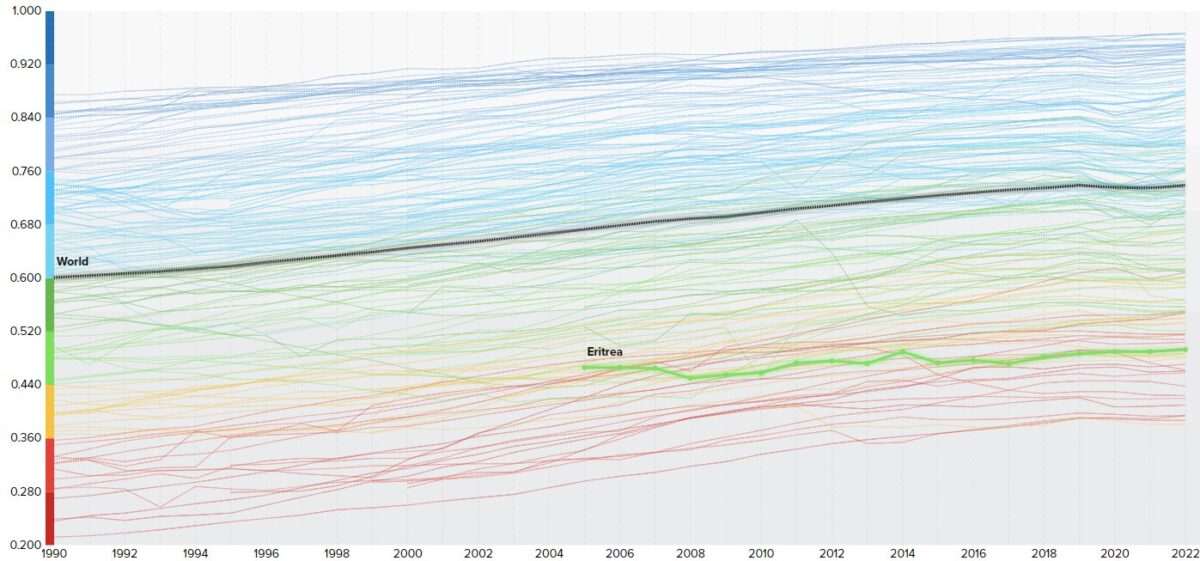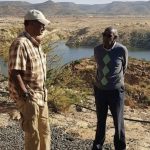Notwithstanding the deliberate efforts by Eritrean state media to hide them and their contributions from the Eritrean public, there are 11 UN agencies in Eritrea. Some of them issue annual reports on Eritrea which are, for the most part, given to them by the Government of Eritrea. UN agencies can consolidate reports given by the host country; they don’t originate them. Here are the reports from UNICEF, UNDESA and UNDP on Eritrea. We are all passionate about Eritrea but do we know what Eritrea is like in measurable things, not just the intangible things we hear about in songs and memes? Here’s one attempt:
UNICEF
Source for Eritrean Data: The State of The World’s Children 2023
| Category | Eritrea | Sub-Saharan Africa |
| Population | 3,6 million | 1.21 billion |
| Population Under 18 | 1.7 million | 600 million |
| Population Under 5 | 486 thousand | 207 million |
| Annual Population Growth Rate % (2020-2030) |
1.7% | 2.5% |
| Total fertility (live births per woman) 2021 | 3.9 | 4.6 |
| Life expectancy at birth (years) | 67 | 61 |
| Annual number of under-five deaths, in thousands | 38 | 74 |
| Infant mortality rate (2021) | 29 | 27 |
| Neo-natal mortality rate (2021) | 17 | 27 |
| Maternal mortality ratio (2020) | 322 | 545 |
| Malnutrition – , children 0-4 yrs age Stunted*, moderate and severe (2020) | 49% | 35% |
| Malnutrition – children 0-4 yrs age Wasted*, moderate and severe, (2016-2022) | 15% | 7.1% |
| Malnutrition among women – 18+ years Underweight (2016) | 17% | 8.9% |
| Malnutrition among women – 15-49 years Anemia | 37% | 41% |
| Net migration rate, World Bank, 2023 | -15,297 | -455,000 |
*Stunted is ratio of height to age; wasted is ratio of weight to height. “Moderate” and “severe” relate to how many standard deviation (s) one is from global (WHO) guidelines for age, height, weight. Both stunting and wasting have negative, sometimes life-long, effects on development of cognitive skills.
SDGs
In about month, the United Nations Department of Economic and Social Affairs (UNDESA) is going to issue its update on how the world is doing on the sustainable development goals (SDGs) it set for year 2030. SDGs are made up of 17 elements, and all members states of the UN signed off on them. Here’s how Eritrea scored as of the last update the UN issued in 2023:
| Goals | Status Update | Trend | Sub-Saharan African Country On Track |
| 1. No Poverty | Major challenges remain | Stagnant | Mauritius |
| 2. Zero Hunger | Major challenges remain | Stagnant | None |
| 3. Good Health & Well-Being | Major challenges remain | Improving slightly | None |
| 4. Quality Education | Major challenges remain | Getting worse | Seychelles |
| 5. Gender Equality | Significant challenges remain | Improving slightly | Namibia |
| 6. Clean Water & Sanitation | Major challenges remain | No Data | None |
| 7. Affordable & Clean Energy | Major challenges remain | Stagnant | None |
| 8. Decent Work & Economic Growth | Major challenges remain | Stagnant | None |
| 9. Industry, Innovation & Infrastructure | Major challenges remain | Stagnant | None |
| 10. Reduced Inequalities | No data | No data | None |
| 11. Sustainable Cities & Communities | Major challenges remain | Getting worse | None |
| 12. Responsible Consumption & Production | SDG Met | Improving | 29 countries |
| 13. Climate Action | SDG Met | Improving slightly | 29 countries |
| 14. Life Below Water | Major challenges remain | Getting worse | None |
| 15. Life On Land | Major challenges remain | Getting worse | None |
| 16. Peace, Justice & Strong Communities | No data | No data | None |
| 17. Partnerships For the Goals | Significant challenges remain | Stagnant | None |
| Summary on 17 SDGS | 11 Major challenges to meet goal
2 Significant challenges to meet goal 2 SDG met 2 No Data |
6 Stagnant 3 Improving slightly 1 Improving 4. Getting worse 3 No Data
|
A “major challenge” is worse than “significant challenge.” And of the 17 SDG elements, Eritrea has 11 major and 2 significant challenges; 2 SDGs with no data, and two SDGs met. And the trends indicate that on the 17 SDG elements, Eritrea is stagnant in 6; getting worse in 4; improving in 4, and has no data on 3. You can see from the above that, contrary to the State media and its propagandists, Eritrea is failing in most categories. The only consolation prize is: so is the rest of Sub-Saharan Africa.
UNDP
Closely related to the SDGs are the United Nations Development Programme (UNDP) Human Development Index (HDI.) In fact, the two are so closely aligned that the elements/categories borrow from each other:

In the Human Development Report 2023/2024, this is where Eritrea ranks: 175th from a list of 193 countries.



At 0.493, Eritrea’s Human Development Index is below the average for (1) Low Human Development countries (0.517); (2) Sub-Saharan Africa countries (0.549) and Least Developed Countries (0.542.) Eritrea is in the bottom quintile, bottom tenth and, in case you are wondering if this is getting better or getting worse since UNDP started gathering HDI date on Eritrea, this is what the trend (green line) looks like:

In 2005, Eritrea’s HDI was 0.466. Seventeen years later, it is 0.493, a 5.7% improvement. Life expectancy, which is a direct result of improvements in maternal and infant mortality rates, grew from 60.6 years to 66.6 years, almost a 10% increase. The Gross National Income (GNI) per capita changed from $1,585 to $1,957, a 23% increase.
Those who support the government of Eritrea always say that Eritrea would have been in a different place if it hadn’t gone to war; if it hadn’t been sanctioned; if it hadn’t been in a state of no-war no-peace for 20 years. But the government had an active role in all three. Just because there is no free press, no legal opposition, no lively parliament in Eritrea does not mean the truth won’t be revealed to the people: thanks to citizen journalism, some of it will. And the government cannot escape from responsibility for betraying the one belief every Eritrean combatant, martyred and alive, held: we will not be like the rest of Africa because we are getting our independence 30 years after most of Africa did. We have learned the lessons. Clearly we have not: Eritrea is worse off than most in many categories.


2 Comments
It is very difficult to get data about Eritrea and the conditions of Eritreans due to the lack of access, good governance, and absence of civil society organizations and institutions in the country.
Thank you for sharing these information.
May Allah help the Eritrean people.
Thank you.
We have not learned the lessons from other African Countries, moreover, we have not learned from our own mistakes. We are stuck in blame, defend and excuse becoming historical prisoners of our own making.